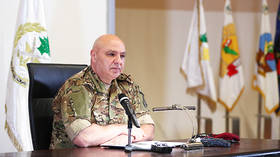Lebanese parliament elects new president

Lebanese army chief Joseph Aoun has been chosen as the country’s new president, ending more than two years of political deadlock. Backed by the US, Aoun will oversee a flagging economy and a delicate ceasefire between Israel and the Hezbollah paramilitary group.
Aoun failed to win a majority during a first round of voting on Thursday, but secured the presidency when lawmakers voted a second time in the afternoon. The commander-in-chief of the Lebanese Armed Forces secured 99 votes, a comfortable majority in Lebanon’s 128-seat parliament.
Under Lebanon’s religious power-sharing system, the president must be a Maronite Christian.
The country has been without a president since October 2022, when Michel Aoun – no relation to the army chief – resigned with his popularity shattered by three years of spiraling inflation, anti-government protests and a devastating explosion at the port in Beirut two years earlier. Sectarian divisions hampered repeated attempts to choose a successor, leaving acting President Najib Mikati in office as a placeholder, while Hezbollah assumed many of the functions of the Lebanese state.
Support from Hezbollah-aligned politicians was critical for Aoun, and his election came a day after Hezbollah-backed candidate Suleiman Frangieh withdrew from the race and endorsed the army chief.
Hezbollah joined Hamas’ war against Israel in October 2023, and for much of the following year fought a low-intensity campaign against the Israel Defense Forces (IDF) along the ‘blue line’ separating Lebanon from Israel and the occupied Golan Heights.
The conflict escalated dramatically in September when Israel began bombarding Hezbollah strongholds in Beirut’s southern suburbs, and by November, dozens of the paramilitary group’s top commanders had been killed in Israeli airstrikes.
Hezbollah signed a ceasefire with Israel in late November. Under the deal, the militant organization agreed to withdraw from the area of southern Lebanon between the blue line and the Litani River, with only Aoun’s forces and UN peacekeepers permitted to deploy in the area. The ceasefire is set to expire in 17 days.
At a meeting in Qatar last month, Aoun secured the backing of Doha, while visits by envoys from the US, France, and Saudi Arabia in the weeks since gave lawmakers the “strong impression” that his candidacy was supported by Washington and its allies, AFP reported.
“My mandate will be one of openness to the East and West, to the international community, based on mutual respect, Lebanon’s sovereignty and the country’s freedom to make its own decisions,” Aoun said in a speech after the election. The army commander also promised to “discuss a defense strategy for the Lebanese state to fight against the Israeli invasion,” and to “rebuild what the Israeli aggression destroyed.”













